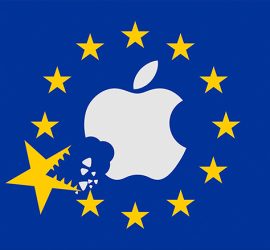Tom Herrenberg* | PhD candidate and lecturer at Leiden Law School | Co-editor of The Fall and Rise of Blasphemy Law (Leiden University Press, 2016) (together with Paul Cliteur) 1. Introduction “Do you want more or less European Union?! … Do you want more or less Partij van de Arbeid (the Dutch center-left Labor Party, added)?! … And thirdly, although actually I’m not allowed to say this … Do you want, in this city and in the Netherlands, more or fewer Moroccans?!” These were the three questions Geert Wilders, the leader of the popular Dutch right-wing Partij voor de Vrijheid […]
Preliminary Reference
Casidhe McClone, Columbia Law School J.D. Candidate 2018 With 3.8% of the global population reporting some use of the drug in 2014, cannabis use has increased roughly 27% since 1998. While 3.8% may seem like a low number, it is still high enough to rank marijuana as the most cultivated, produced, trafficked and consumed drug in the world (using 2014 statistics). Considering the drug’s prevalence, some states have pursued an approach to regulation called decriminalization, through which the drug remains illegal but enforcement against users is deprioritized. One EU member, Portugal, took a bigger step 15 years ago and formally […]
Gan Hui Zhen | JD Candidate, Columbia Law School 2018 When the EU Member States introduced EU Citizenship into the 1993 Maastricht Treaty, they arguably did not foresee that this would open up the Pandora’s box that eventually led to the creation of “welfare tourism.” After all, EU Citizenship as originally conceived only granted a small range of civil and political rights – most significantly, the right to vote, and the right to stand as candidate in elections to the European Parliament, as embodied in Article 20, Section 2(a) TFEU. However, EU Citizenship underwent a radical expansion, enabled by the […]
Margherita Anchini | PhD Candidate, Sapienza Law School (Rome) 1. Introduction The role of the European Union in the sphere of public services has always been problematic. Before the creation of a European concept of public service, national authorities had wide discretion to define the concept, and they exercised this power for the purpose of removing particular sectors from the application of EU law (especially competition rules). If some space for national discretion persists, it is clearly limited. In an international context, the concept of public service is a convenient shorthand for utilities and welfare services. In light of the […]
Joanna Diane Caytas JD Candidate, Columbia Law School 2017 The post-2008 public debt crisis alerted the Eurozone – and Europe as a whole – to its dangerous love affair with the outdated notion that states cannot go bankrupt and therefore can take on quasi-unlimited levels of debt. Greece and Cyprus called this bluff in 2012-13 with dramatic consequences. Ever since, the continent has been in search of ways and means to bring under control unsustainable levels of sovereign borrowings that cannot be passed on to the banking and financial sector without laying the foundation for equally expensive bailouts. Just as […]
Aaron Rogoff | J.D. Candidate 2017, Columbia Law School | Editor-in-Chief Is European soccer headed for a competition law standoff? The monumental growth in revenue from the sale of TV broadcasting rights for Europe’s major soccer leagues has made membership in a top league a valuable economic right. European leagues differ from the “Big Four” U.S. sports leagues (the NFL, NBA, MLB, and NHL) in that league membership is not fixed. In the U.S., any change in team membership requires collective action by the ownership of all existing teams, whereas in Europe the makeup of each domestic league changes on an […]
Caroline Ceriello, J.D. Candidate 2017, Columbia Law School With its remarkably low corporate tax rate of 12.5%, Ireland has become home to many companies formerly headquartered in the United States and seeking refuge from the 35% U.S. tax rate. In this context, a “tax inversion” usually refers to a corporate restructuring in which a U.S. corporation is acquired by a foreign holding company and assumes its foreign headquarters as a subsidiary. However, the entity remains listed under the U.S. issuer’s name in U.S. securities markets. As Professor Eric Talley emphasizes, there are three key unique features of the U.S. tax […]
HY Kim, J.D. Candidate 2017, Columbia Law School Background On March 31, 2016, a German satirist, Jan Böhmermann, ignited a debate on the relevance of an arguably outdated statute by reading an obscene poem about the Turkish President Recep Tayyip Erdogan on the weekly German satirical show “Neo Magazin Royal.” The poem included insults and made light of the very fact that the act of reciting such a poem would be considered illegal in Turkey. Little did Böhmermann know, this act was also illegal in Germany. After the conclusion of an investigation, launched by Chancellor Angela Merkel at the request […]
Emmanouil Bougiakiotis, LLB, Democritus University of Thrace, Greece, Legal Intern at the Hellenic Data Protection Authority. All views expressed are personal. I. Introduction Publicity is a notion that becomes a matter of growing importance in European law, as it can affect numerous rights, such as. the rights to privacy, personal data, freedom of expression and, to some extent, the right of access to documents. However, almost no attention has been given to the conceptual issues with regard to the notion of publication and its characteristics, although they may be crucial in the outcome of a legal judgement. A characteristic example of […]
Colleen Baehrend, J.D. Candidate, Columbia Law School 2017 The process of unravelling the partnership between the one of the largest economies in the world and the most prominent trade bloc comes down to only 261 words: the text of Article 50 of the Lisbon Treaty. With such brief guidelines and no precedent to work with, how exactly the divorce between the U.K. and EU will proceed is shrouded in uncertainty. Starting at the source, Article 50(1) gives Member States the right to withdraw from the EU “in accordance with its own constitutional requirements.” Thus, Article 50 must be invoked […]
Dr. Agne Limante, Law Institute of Lithuania On 16th June 2016 the Advocate General Melchior Wathelet issued his opinion in Child and Family Agency (CAFA) v. J. D. In it, the Advocate General offered his position as to how conditions for the transfer of proceedings under Article 15 of the Brussels II bis Regulation should be interpreted. This opinion is of interest to those dealing with private international law and family law issues, and especially to those interested with the application of the Brussels II bis Regulation. The Brussels II bis Regulation establishes rules for jurisdiction, recognition and enforcement of judgments […]
Joanna Diane Caytas J.D. Candidate, Columbia Law School 2017 Framing the issue U.S. and European payment systems as we fondly know them are notoriously antediluvian. In China, all a consumer needs to do to send money is to input on their phone the beneficiary’s 16-18 digit account number, name, and bank name. Final credit is typically received in 5 seconds – not up to 5 hours, as for a U.S. domestic wire. Nor do Chinese consumers experience the grotesque fees charged for Western Union’s “instant money,” which in most cases still requires a trip to clear physical cash. There is […]
Aaron Rogoff J.D. Candidate, Columbia Law School 2017 Editor-In-Chief, Columbia Journal of European Law Introduction – What is at Stake for UK Pharma The British pharmaceutical industry employs 183,000 people and accounts for annual sales worth £ 56 billion (€ 71.39 billion). Its leaders have been vocal opponents of the UK referendum to leave the EU. Their comments refer to a number of negative implications for pharmaceutical companies, including the loss of their investment in achieving regulatory alignment for drug development under the European Medicines Agency (EMA), the cost and instability that will result if that regime must be revised […]
by Brian Christopher Jones, Lecturer in Public Law, Liverpool Hope University. Justifications for constraints or losses of sovereignty have particular merits, some more defensible than others. In the UK’s case, there is little doubt that joining the EU has resulted in at least some loss of sovereignty (despite the fact that Parliament retains the right to repeal the European Communities Act 1972). Even though the UK knew going in that there were serious sovereignty implications, probably few could have predicted in 1972 that the EU would now resemble such a close political union, potentially on the verge of incorporating a federalist […]
Dr. Marcel Gade LL.M., Columbia Law School, 2016 Ducunt volentem fata, nolentem trahunt – Seneca On February 19, 2016 Sweett Group plc (Sweett), a UK based construction company, was sentenced in the Southwark Crown Court pursuant to Section 7 of the UK Bribery Act 2010 to a payment of about £2.25m, consisting of a fine of £1.4m, a confiscation amount of £851,152 and £95,000 in prosecution costs. The sentence followed a guilty plea in December 2015 and ended a one-year long investigation by the Serious Fraud Office (SFO). So, what had happened? In 2014 the SFO started investigating allegations that […]
Marjorie Becker LL.M., Columbia Law School, 2016 By striking down the 15-year old Safe Harbor Framework in its decision Schrems v. Data Protection Commissioner on October 6, 2015,[1] the Court of Justice of the European Union (CJEU) left most self-certified U.S. companies in limbo. The Privacy Shield announced on February 2, 2016 by the EU Commission and the U.S. Department of Commerce (DOC), however, may yet provide relief to some of them. This new framework comprises various documents—summarized in the draft adequacy decision and related annexes released on February 29, 2016—and aims to comply with the requirements of Schrems by […]
Joanna Diane Caytas J.D. Candidate, Columbia Law School, 2017 Introduction The murderous rampages at Charlie Hebdo in Paris in January 2015, in Copenhagen in February 2015, and all across Paris on November 13, 2015 not only shocked the world’s conscience but also resurfaced a controversy over blasphemy laws that, prior to the advent of fundamentalist religious terrorism, had been thought a relic of a bygone era. These rampages also sparked discussions concerning the existence of a common European identity of values, secular humanism as a minimum constitutional denominator, and the difference between attacking people and ideas. Islamic groups are the […]
Justin Lee J.D. Candidate, Columbia Law School, 2017 A referendum on the United Kingdom’s membership in the European Union (the Brexit referendum) is set to take place on June 23, 2016. Facing the rise of the anti-EU UK Independence Party and convincing predictions for a hung parliament, UK Prime Minister David Cameron had promised the Brexit referendum as part of his 2015 General Election campaign. Cameron led his Conservative Party to victory and become the second Prime Minister of the UK, only after Margaret Thatcher, to increase his party’s majority while in power. The Prime Minister, who is in the […]
Columbia Law School’s first-year students are given the unique opportunity to participate in moot court competitions at the beginning of their law school tenure. One of the international moot court programs with a strong tradition at CLS is the European Law Moot Court. On February 6, 2016, the team of César Rivere ’18, Eliana Sanchez ’18, Jake Bogart ’18, and Rachel LaFortune ’18 competed in a regional final at the University of Helsinki in Finland. The following weekend, the team of Ani Hamparsumyan ’17, Emily Hush ’18, Julie Nkodo ’18, and Kate Witchger ’18 competed at the National and Kapodistrian […]



















